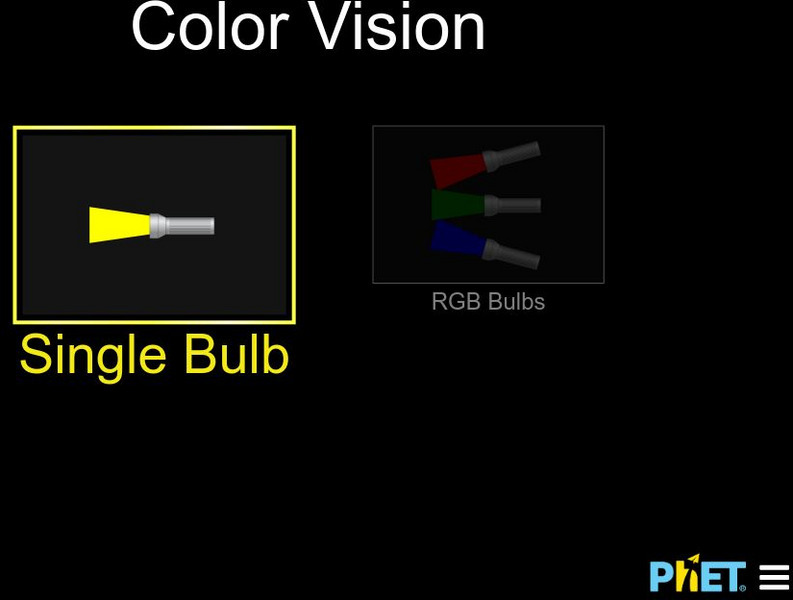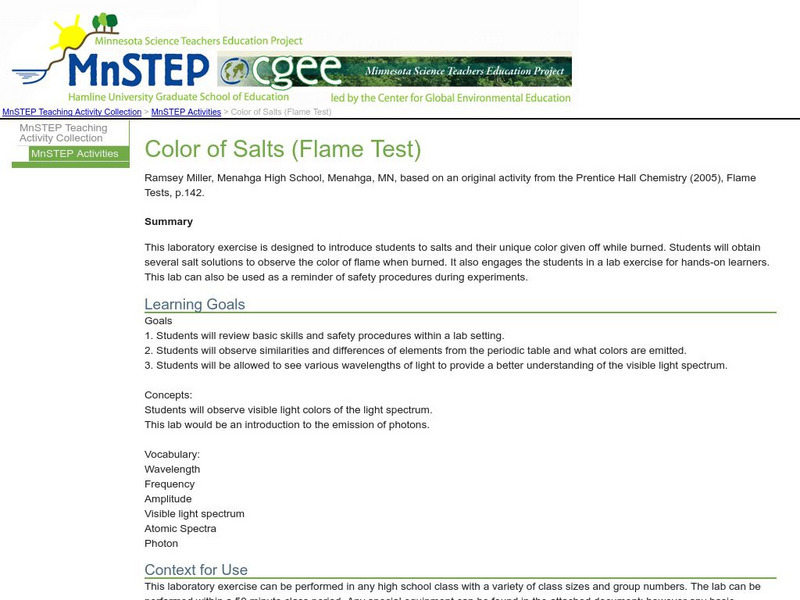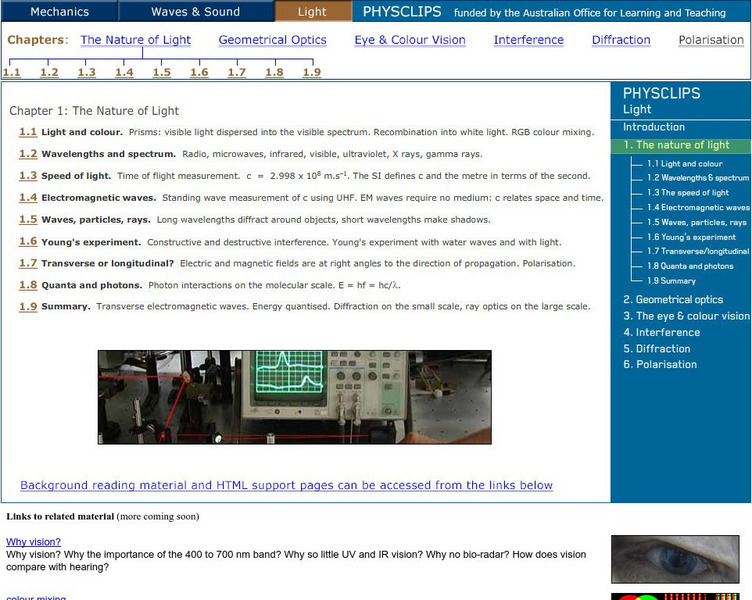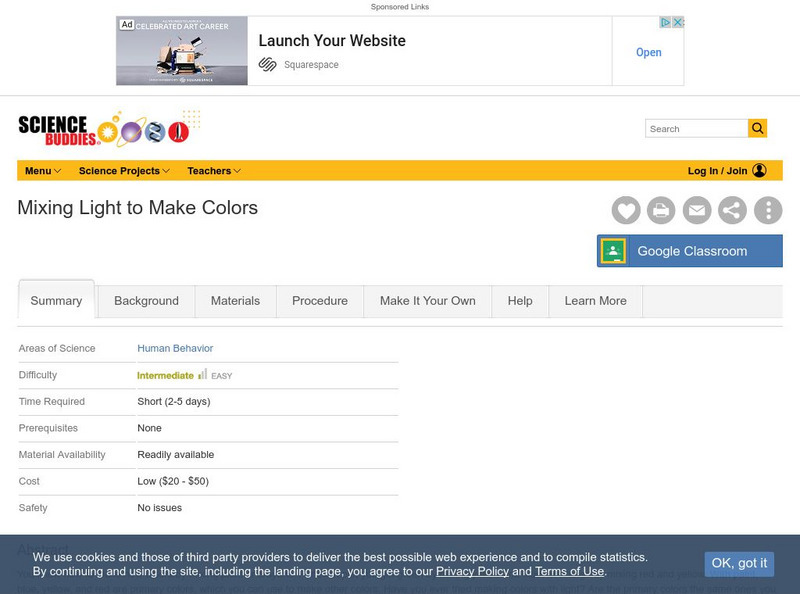Curated OER
Enlightening Explorations, Part III
Sixth graders continue their examination of light. In groups, they make rainbows and examine the spectrum of visible light. They travel between various stations recording their observations about the behaviors of light. To end the...
Curated OER
Jell-O Optics
Students observe an activity with Jell-O to learn about optics. In this investigative lesson students fill out a handout on the activity that helps them to investigate the index of refraction and the speed of light.
Curated OER
The Colors on My TV Screen
Students explore how electronic screens use only three colors to produce the colors that people see on the screen. They make and test a color wheel.
Curated OER
Constructing a Spectroscope
Students construct a simple spectroscope. They observe the emission spectrum produce by a source of light.
Curated OER
Mixing Colors
Students understand why we see various colors. In this mixing colors instructional activity, students experiment with different food coloring to explore how colors are made. Students record on a data sheet the colors they see.
Curated OER
Online Exploration: Telescopes From the Ground Up
Students explore a web-based illustrated text and interactive graphics to determine the relationship between the operation of telescopes and light. optics. They work in small groups to become an expert on one of the ten eras of telescope...
Curated OER
Leaf Chromatography
In this leaf chromatography worksheet, students separate the pigments of a leaf using paper chromatography. They answer 4 questions about their results and draw the colors they observe on their chromatogram from the leaf.
Curated OER
Plant Pigments
Students investigate the components of chlorophyll. They use paper chromatography to separate the many pigments of chlorophyll from one another.
Curated OER
Modeling Drug Assimilation in the Human Body
Students investigate the accumulation of drugs in the body. In this algebra lesson, students collect data on drug retention and assimilation. They use their data to predict the behavior and effects of drugs.
Curated OER
Spectral Surprise
Students create spectral colors. In this hands-on science lesson, students examine the electromagnetic spectrum as they follow steps to create a model that separates and displays light.
Curated OER
Electromagnetic Spectrum/Spectroscopy
Learners examine the electromagnetic spectrum and demonstrate the elements within. In this investigative lesson students complete a demonstration and calculate the energy of a photon.
Curated OER
Jupiter's Moons
Students predict which of Jupiter's moons will be the "brightest" in infrared wavelengths. Using provided information, they rank the moos from brightes to faintest in infrared.
Curated OER
Supernova Chemistry
Using spectroscopes, high school astronomy, physics, or chemistry learners observe emission spectra from several different sources. This stellar NASA-produced lesson plan provides terrific teacher's notes and a student handout. Make sure...
Curated OER
Chandra X-Ray Observatory
Students tour Chandra's top galactic X-ray images. For this Chandra X-Ray Observatory lesson, students play games and complete puzzles based on the Chandra Mission and X-Ray Astronomy. Students listen to pod casts, question an...
Curated OER
Spectral Surprise
Students experience a model that produces, separating, and displaying spectral colors.
Physics Classroom
The Physics Classroom: Color Addition
This tutorial on the addition of color to light discusses the primary, complimentary, and secondary colors of light.
University of Colorado
University of Colorado: Ph Et Interactive Simulations: Color Vision
An interactive simulation that teaches about photons, monochromatic light, white light, and rainbows through changing wavelengths, beams, filters, and color combinations. This simulation can either be downloaded or played online and...
University of Colorado
University of Colorado: Ph Et Interactive Simulations: Color Vision
Make a whole rainbow by mixing red, green, and blue light. Change the wavelength of a monochromatic beam or filter white light. View the light as a solid beam, or see the individual photons.
Science Education Resource Center at Carleton College
Serc: Color of Salts Flame Test
This laboratory exercise is designed to introduce students to salts and their unique color given off while burned. Students will obtain several salt solutions to observe the color of flame when burned.
Florida State University
Florida State University: Molecular Expressions: Refraction of Light
Manipulate the incident angle, color of light, wavelength, and medium to see how the refracted angle is affected.
University of New South Wales (Australia)
University of New South Wales: School of Physics: Physclips:the Nature of Light
Physiclips thoroughly presents mechanics concepts about light with animations and film clips. Learn about light and color, wavelengths, speed of light, electromagnetic waves, Young's experiment, and photons.
Florida State University
Florida State University: Molecular Expressions Microscopy Primer: Light and Color Refraction of Light
Comprehensive and sophisticated overview of light refraction includes an historical overview of the subject and explanations of the mathematics that underpin refractive indexes, the relative index of refraction, Snell's law, and light...
PBS
Pbs Learning Media: Wavelength
In this interactive activity adapted from the University of Utah's ASPIRE Lab, students will learn how to measure wavelengths and see how wavelength affects the color of the light that we see.
Science Buddies
Science Buddies: Mixing Light to Make Colors
You know how to make new colors by mixing paint or crayons. For example, you get green by mixing yellow and blue, or orange by mixing red and yellow. With paint, blue, yellow, and red are primary colors, which you can use to make other...






















